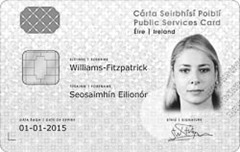Public services cards: two years on
 The public services card is now used by around a quarter of the population.
The public services card is now used by around a quarter of the population.
Twenty-four per cent of people living in the State now have their own public services card but relatively little public debate about the privacy consequences is taking place. A total of 1,095,000 cards have been produced since their introduction in 2012. Of these, 318,500 are free travel variants, mainly for people aged over 66.
Plans for the scheme were launched in February 2011 by previous Minister for Social Protection Éamon Ó Cuív but opposed by the Irish Council for Civil Liberties.
The ICCL firstly claimed that the cards could compromise privacy but collecting a significant set of private information and storing it in one place. It also questioned the timing as a “political stunt” as the announcement took place on the last sitting day before the general election. The cards were also being introduced at the same time as the UK’s similarly designed national identity cards were being withdrawn.
A robust debate took place in Britain with Labour proposing ID cards and the Conservative and Liberal Democrats in opposition. However, none of Ireland’s main political parties objected to the card and it was adopted by Fine Gael and Labour.
The Government states that the card will enable individuals to access public services more efficiently, reduce the possibility of theft, forgery and fraud, and preserve privacy “to the maximum extent possible”. Holders of the existing social services cards and free travel passes are being invited to register in phases along with their spouses, civil partners and cohabitants.
Registration generally involves examining documents to prove a person’s identity and address, background database checks, a face-to-face interview and matching their facial image with their photograph. The full dataset, contained on a secure chip, includes the person’s name, PPS number, photograph, signature, card issue number and expiry date, nationality, date and place of birth, gender, and all former surnames (if any) of the holder and his or her mother.
Once a person receives their free travel variant card, their existing free travel pass will become invalid and should be returned to the department. However, if they have a Senior Smartpass card for Northern Ireland, they should retain this in order to travel on public transport across the border.
The face-to-face registration process take around 15 minutes and is usually completed in the local social welfare office or Intreo centre. Identity can be proven by presenting a passport, UK or Irish driving licence, learner driver permit, full birth or adoption certificate, certificate of naturalisation, foreign birth registration certificate or national identity card (where applicable for EU nationals).
All applicants must also present a proof of address i.e. a current utility bill, property lease, tenancy agreement, or receipt for payment of household charge.
Additional helpful documents that can help to confirm a person’s identity include the free travel pass, medical card, European health insurance card, credit or debit card, or student card. If none are available, other documents or forms of photo ID should be sought. However, baptismal certificates, work ID cards, and photocopied or expired documents cannot be accepted.
The department may also write out to the applicant and ask for their permission to use existing data.
A Department of Social Protection spokeswoman said that the project is “an important component of an overall framework for modernising public service delivery in a customer-centric way.” Several other government departments are looking at how they can use the cards and the face-to-face standard authentication framework environment (SAFE) registration process to authenticate identity, replace other cards and provide online services.





